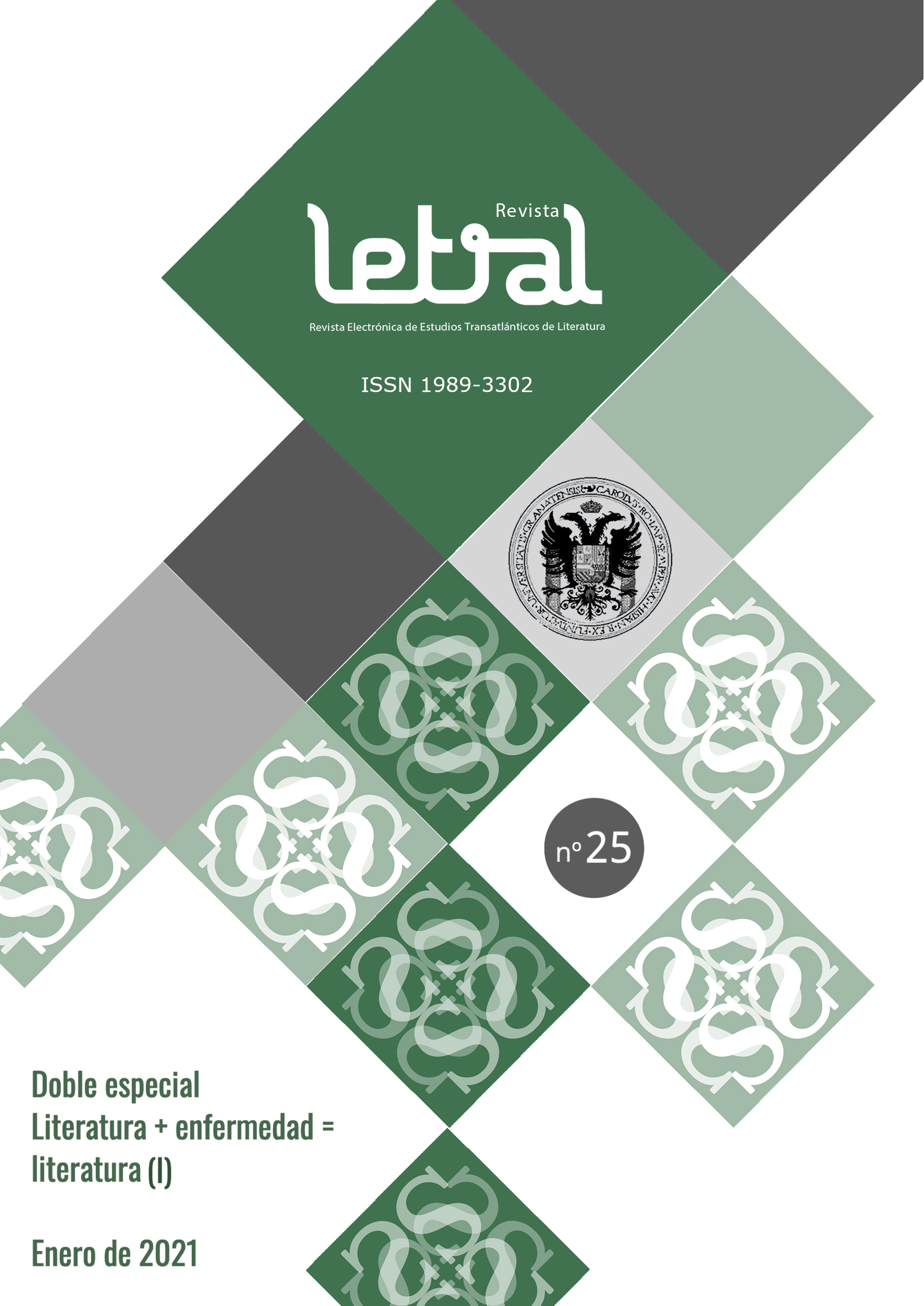Corpus Aegrotum. Pathology as a Literary Principle in Nancy by Bruno Lloret
DOI:
https://doi.org/10.30827/rl.v0i25.16306Keywords:
Bruno Lloret, Nancy, illness, materiality, semiologyAbstract
This paper proposes a media-theory and literary-materiality-based approach to Nancy, a novel published in 2015 by Chilean writer Bruno Lloret. Moreover, this study is to be understood as an experiment towards a dialogical philology, in which the author –in this case Lloret– is invited to comment on the paper. At the core of the observations stands the cancer that affects Nancy, the novel’s homo and intradiegetic narrator. Nancy’s illness is replicated semiotically and materially in the book, through the proliferation of non-verbal elements in the textual body. By interpreting verbal and non-verbal elements as symptoms of the protagonist’s illness, philological semiology and medical semiology become two complementary keys for understanding how pathology becomes a literary principle.
Downloads
References
Andrioli, Larissa. “Stuff we love. Afeto, Presença e Materialidade no Design de Livros”. MatLit, vol. 2, n.º 1, 2014, pp. 119-134.
Barthes, Roland. “La mort de l’auteur”. Manteia, n.º 5, 1968, pp. 61-67.
Baudry, Jean-Louis. “Effets idéologiques produits par l’appareil de base”. Cinéthique, n.º 78, 1970, pp. 1-8.
Baudry, Jean-Louis. “Le dispositif”. Communications, n.º 23, 1975, pp. 56-72.
Benhamou, Françoise. El libro en la era digital. Papel, pantallas y otras derivas. Buenos Aires, Paidós, 2015.
Bolter, Jay David. Writing Space. Computers, Hypertext and the Remediation of Print. Londres/Nueva York, Routledge, 2011.
Bornand, José. El poder sobre la enfermedad. Lecturas patológicas de El Río de Alfredo Gómez Morel y Nancy de Bruno Lloret. Santiago, Universidad de Chile 2018. Tesis de licenciatura, disponible en: researchgate.net/publication/333031083
Daniel, Stephen L. “The Patient as Text. A Model of Clinical Hermeneutics”. Theoretical Medicine, n.º 7, 1986, pp. 195-210.
Doležel, Lubomir. “Semiotics of literary communication”. Strumenti critici, vol. 1, n.º 1, 1986, pp. 5-48.
Foucault, Michel. L’ordre du discours. Paris, Gallimard, 1971.
Gainza, Carolina. Narrativas y poéticas digitales en América Latina. Producción literaria en el capitalismo informacional. Santiago, Cuarto Propio, 2018.
Huss, Mathias. La grant danse macabre. Lyon, 1499. Facsímil digital: catalog.princeton.edu/catalog/4991066
Kittler, Friedrich. Grammophon, Film, Typewriter. Berlín, Brinkmann & Bose, 1986.
Kittler, Friedrich. “No hay ningún software”. La verdad del mundo técnico. Ensayos para una genealogía del presente. México, FCE, 2018, pp. 245-256.
Lloret, Bruno. Nancy. Santiago, Cuneta, 2015.
McLuhan, Marshall. Understanding Media. The Extensions of Man. Nueva York, McGraw-Hill, 1964.
Megenburg, Konrad von. Buch der Natur. 1442. Facsímil digital: digi.ub.uni-heidelberg.de/diglit/cpg286
Mol, Annemarie. The body multiple. Ontology in medical practice. Durham, Duke University Press, 2002.
Mukařovský, Jan. “Sobre el estructuralismo”. Signo, función y valor. Estética y semiótica del arte de Jan Mukařovský. Jarmila Jandová y Emil Volek (eds.). Bogotá, Universidad Nacional de Colombia, 2000, pp. 303-318.
Nancy, Jean-Luc. Corpus. Paris, Metailié, 2000.
Sontag, Susan. “What’s happening to America. A Symposium”. Partizan Review, vol. 34, n.º 1, 1967, pp. 13-81.
Sontag, Susan. Illness as Metaphor. Nueva York, Farrar, Straus and Giroux, 1978.
Starobinski, Jean. “Segalen aux confins de la médecine” (Prefácio). Victor Segalen. Les cliniciens ès lettres. Saint-Clément-de-Rivière, Fata Morgana, 1980, pp. 6-36.
Published
How to Cite
Issue
Section
License
Revista Letral is an open access journal under a Creative Commons Atribución-NoComercial 4.0 license.
The works published in this journal may be reused, distributed and publicly presented for non-commercial purposes, provided that: cite the authorship and the original source of the publication (journal, publisher and URL of the work).
We strongly recommended you to share our published articles in social and scientific networks, institutional and public repositories, personal or institutional websites, blogs, Google Scholar, ORCID, ResearchID, ScopusID, etc.
The journal allow the author(s) to hold the copyright and to retain publishing rights without restrictions.
We are completely free, both for readers and authors.














